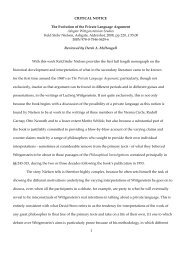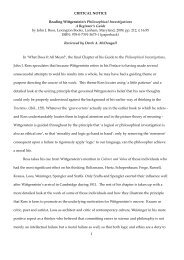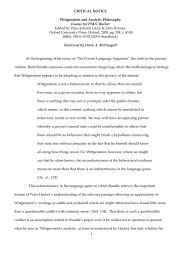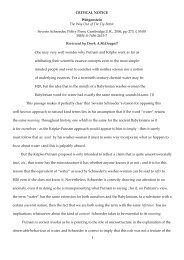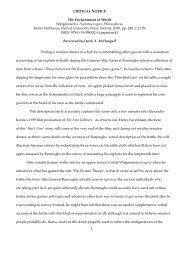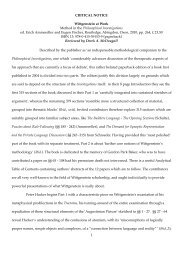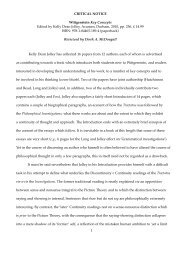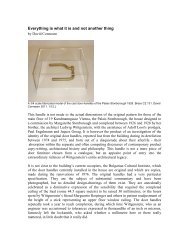Wittgenstein's Philosophical Investigations A Critical Guide
Wittgenstein's Philosophical Investigations A Critical Guide
Wittgenstein's Philosophical Investigations A Critical Guide
Create successful ePaper yourself
Turn your PDF publications into a flip-book with our unique Google optimized e-Paper software.
These ideas have not been appreciated sufficiently by scholars.<br />
My essay is an attempt to fill this lacuna. (Ibid., 91)<br />
Few scholars today would wish to tackle these questions at the appropriate level of<br />
generality, and Glock is undoubtedly one who can assemble within the short space of twenty<br />
pages or so the extraordinary range of considerations that enter into filling the lacuna that he<br />
discerns, including concepts as the source of philosophical problems, as the basis for ‘analysis’<br />
(§ 383) through describing the use of words, as reflecting our interests and form of life, and as<br />
a pointer to the autonomy of grammar (Ibid., 91) . Furthermore, in philosophy there has been a<br />
fundamental distinction between ‘objectivist’ notions of concepts as objects or abstractions from<br />
linguistic practice, and ‘subjectivist’ notions of concepts as phenomena of the human mind or brain.<br />
Glock sees the former (roughly) represented by Wittgenstein, Ryle, and neo-Fregeans, the latter by<br />
Fodor and others. Glock raises five questions about concepts which he considers throughout the<br />
remainder of his paper, and Wittgenstein’s answers to these as assessed by Glock relate to conceptpossession<br />
(priority question), the mastery of the use of an expression (possession question), the way<br />
in which and the degree to which concepts are as distinguishable one from another as are word<br />
meanings (individuation question), the technique of using words (definition question), and the role of<br />
concepts in classification and inference (function question). Glock’s paper demands close reading, yet<br />
those who are already committed to a more therapeutic perspective than he is, are almost bound to see<br />
even the attempt to classify Wittgenstein’s reflections in this way as somehow at odds with his overall<br />
perspective on philosophy. Glock’s paper offers a significant challenge to this opposing approach.<br />
The major difficulty a reader will encounter in coming to terms with ‘Wittgenstein vs<br />
contextualism’ by James Bridges, will inevitably rest in his ability to acquire a proper grasp of what<br />
contextualism is, and as a first approximation he takes it to be the view that ‘the content of an utterance<br />
is shaped in far-reaching and unobvious ways by the circumstances, the context, in which it is uttered’<br />
(Ibid., 109). Consequently, the same sentence uttered at different times might vary in ‘content’ - surely<br />
a highly dangerous word - content that fails, as Bridges puts it, to ‘map’ onto any obvious indexical<br />
20



